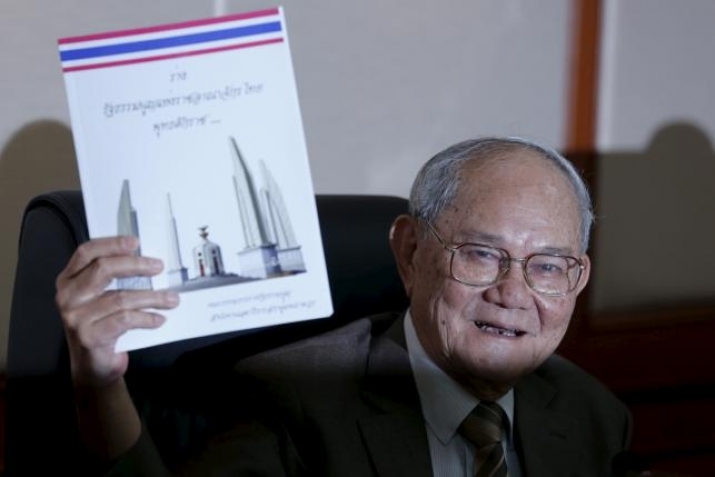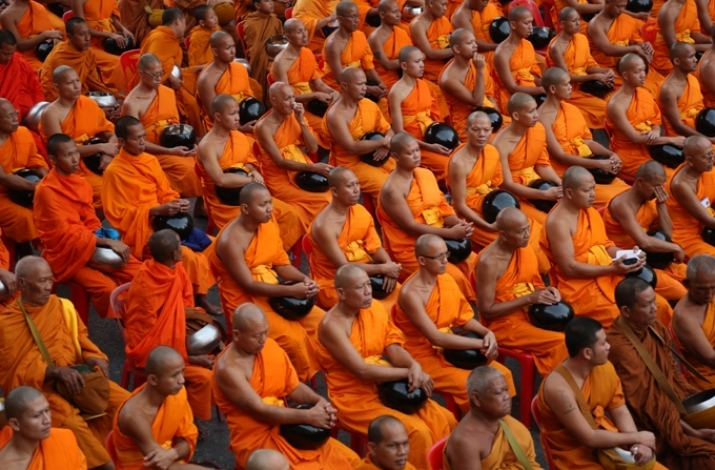NEWS
Thailand’s New Draft Charter Compromises on Calls to Enshrine Buddhism as State Religion
 Meechai Ruchupan, head of the constitution-drafting panel appointed by Thailand's military government, holds the final draft of the kingdom's latest constitution. Photo by Chaiwat Subprasom. From reuters.com
Meechai Ruchupan, head of the constitution-drafting panel appointed by Thailand's military government, holds the final draft of the kingdom's latest constitution. Photo by Chaiwat Subprasom. From reuters.comA panel appointed by Thailand’s ruling junta, the National Council for Peace and Order, has unveiled a long-awaited new draft constitution aimed at resolving the kingdom’s decade-long political crisis. The new charter, which critics assert only serves to strengthen the military’s political influence, also includes concessions to nationalist groups that have demanded that Buddhism be recognized as the national religion.
The Constitution Drafting Committee (CDC) submitted the final version of the new charter to the military government on Tuesday after nearly six months of work. The fate of the charter is due to be decided by public referendum on 7 August. If it is approved, nationwide parliamentary elections could be held in 2017. Critics of the new constitution—Thailand’s 20th in 84 years of turbulent democracy since 1932, which have been punctuated by a similar number of military coups—say it will strengthen the military’s grip on power. Controversial clauses include provisions for a 250-member unelected upper house Senate and the appointment of top military officers to the Senate. Thailand has been under military rule since a 2014 coup overthrew the government of Yingluck Shinawatra, the daughter of billionaire and fugitive former prime minister Thaksin Shinawatra.
While the drafters have not yielded to pressure from vocal nationalist groups to install Buddhism as the kingdom’s official religion, the new charter does include provisions to protect the religion. Article 67 of the document reads: “The state shall protect and patronize Buddhism and other religions. In protecting Buddhism, which is the religion to which the majority of the Thai people have adhered since time immemorial, the state shall encourage education to promote the teachings of Theravada Buddhism for the development of the mind and wisdom, and shall implement measures to prevent any forms of harm or threat against Buddhism, together with encouraging Buddhists to take part in enacting these measures.” (Prachatai English)
Data for 2010 from the Washington, D.C.-based Pew Research Center indicates that 93.2 per cent of Thais identify as Buddhists, with Theravada Buddhism by far the most widely practiced tradition. The country’s widely revered king is required by law to be Theravada Buddhist.
A previous bid to make Buddhism the kingdom’s state religion in 2007, backed by a petition signed by 300,000 supporters, was rejected by the constitution-drafting panel established by a previous military government. Article 79 of the 2007 Constitution directs that the state should protect and patronize Buddhism and foster goodwill and cooperation among all faiths to encourage good morale and the development of living standards.
 Moderate Buddhists in Thailand have cautioned that recognizing a state religion could antagonize religious discord in the kingdom. From aljazeera.com
Moderate Buddhists in Thailand have cautioned that recognizing a state religion could antagonize religious discord in the kingdom. From aljazeera.comMembers of the National Network to Protect Buddhism and representatives of Thailand’s monastic sangha last week submitted a petition of 100,000 names to the CDC in support of the controversial campaign for a state religion. The group is reported to have told the panel that making Buddhism the national religion would make it easier for the draft to be accepted in the upcoming referendum.
Prominent Buddhist scholar Sulak Sivaraksa, a founder of the International Network of Engaged Buddhists, has cautioned that such a move could serve to antagonize religious discord in the country. “Those who think like this are extremely nationalistic,” he said, attributing the demand to an overly narrow understanding of Buddhist teachings and a prevailing undercurrent of ultra-nationalism in Thai society. (Khaosod English)
“It’s because this country has taught people to be nationalistic, so they think we must have a national religion too,” he said, noting that, “Buddhism is also a religion which teaches people to reduce one’s ego and to nurture loving kindness. The Buddha taught people to love all mankind.” (Khaosod English)
See more
Measures to protect Buddhism emerge as charter draft is unveiled (Prachatai English)
All in good time: draft Thai charter handed over ahead of August vote (Reuters)
Draft risks regime staying on (Bangkok Post)
Buddhist Scholar Warns Against Establishing National Religion (Khaosod English)
Sangha Wars: Conflict between Dhammakaya and Buddhist Establishment Spills over into Thai Politics (Buddhistdoor Global)
Thai Buddhist Scholar Cautions Against Enshrining Buddhism as State Religion (Buddhistdoor Global)
Buddhist Groups Push to Make Buddhism Thailand’s Official Religion (Buddhistdoor Global)














